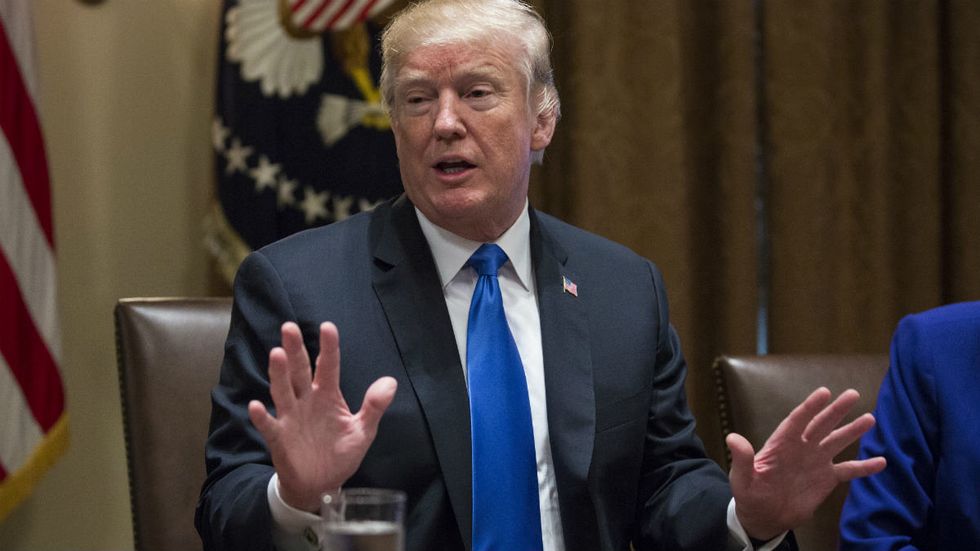
© 2024 Blaze Media LLC. All rights reserved.
Trump is obligated to follow immigration law, NOT the capricious rulings of district judges
March 06, 2018
If one district judge demands that a president take a given course of action and another district judge prohibits the president from making such a move, what’s a president to do? He should ignore the judiciary, of course, and only take executive action pursuant to the law and the Constitution as he sees it.
When leftist organizations forum-shop their political issues to liberal judicial districts, seeking a phantom nationwide veto on a law or executive policy, they are not always guaranteed they will get a likeminded judge drawn by random selection. Until recently, all of their immigration lawsuits against Trump’s decision to end executive amnesty have been successful, but yesterday their case before the Maryland federal district resulted in a loss. Although the Bush-appointed judge sitting in the Baltimore-based court noted throughout his opinion yesterday that he sympathized with DACA amnesty from a political standpoint, he still has respect for the law, noting that Obama’s DAPA amnesty was already ruled unlawful and that Trump was legally correct to rescind DACA, which was “largely” a similar program.
The lawsuit, brought by Casa de Maryland, an organization that openly harbors criminal aliens, was dismissed yesterday by Judge Titus, who noted that “the rescission of the DACA program merely fulfills the duty of the executive branch to faithfully enforce the laws passed by Congress.” He observed a number of times that he believes it is our moral duty to grant amnesty, expressed that he was disheartened by “the unfortunate and often inflammatory rhetoric used by President Trump during the campaign,” and asserted that he does not like the outcome of the decision he arrived at, but he was at least intellectually honest enough not to codify his gratuitous virtue-signaling into the actual court order.
This stands in contrast to the orders issued by Judges William Alsup of San Francisco and Nicholas Garaufis of New York, who mandated that Trump continue Obama’s amnesty because they were offended by his political views. Both of them applied their rulings nationwide.
The big question everyone is asking in light of the conflicting district judge rulings is what happens next? But this question itself reveals a broader absurdity in this new lawless system of district judges issuing nationwide edicts on policy rather than judicial judgments over individual plaintiffs within their respective geographical jurisdictions.
The “heads I win, tails I win” judicial system of the Left
Under the phantom and rigged system the legal profession created in this generation, here’s how it works: Any time leftists don’t like a federal statute or executive policy pursuant to statute that applies nationwide, they can shop a lawsuit around to a number of districts that contain a majority of Democrat-appointed judges. They will specifically avoid areas that have conservative judges in the majority on the panels and circuits where they will likely lose on appeal, such as the Fifth and Eighth circuits. Then, all they have to do is win in one district and have that judge nullify the policy nationwide. Thus, even if they lose in a number of districts, they win nationwide with a single district judge.
Why?
They will tell you that a judge throwing out a lawsuit and asserting that the executive policy is indeed lawful doesn’t affirmatively ratify the policy nationwide or even within the given district. It merely dismisses that particular case or controversy for that plaintiff. However, the one district judge that sided with the plaintiffs and issued a nationwide injunction, in their opinion, must be treated as the controlling case, effectively vetoing the policy nationwide unless the decision is overturned by a higher court. And given that they shop these district judges only in circuits where they win appeals, it takes months or years to reach the Supreme Court (if ever), because they avoid a circuit split.
The absurdity that results from this system is that, theoretically, if open-borders advocates were to lose in 93 of the 94 federal district courts but induce one extreme district judge to issue a nationwide injunction, that one order would reign supreme – and be regarded as instantaneous and unassailable national policy.
The difference between judicial review and judicial supremacy
This is where they are wrong and where it’s time for Trump to finally assert his own constitutional powers. The same way a judge ruling in Trump’s favor to dismiss a lawsuit only applies to that particular case or controversy, a judge ruling for the plaintiffs only applies to that particular case or controversy, and certainly not outside the geographical jurisdiction of a lower court judge. This is what distinguishes the judicial power from executive or legislative policy-making power.
Even those who are devoted to the religion of judicial review must understand the difference between judicial review and judicial supremacy, particularly at the lower court level. The concept of judicial review simply means that although courts usually interpret the law, if the law itself is manifestly against the Constitution and violates a universally understood fundamental right, the judge has an obligation to grant the plaintiff relief, irrespective of what the statute says, if the plaintiff has legitimate standing before a court (unlike an illegal alien suing for status). However, not even the Supreme Court can actively “strike down” or “veto” a bill, the same way they can’t “uphold” or ratify a law or policy. They rule for that particular case. But if they seek to make their ruling binding precedent on national policy, that is where the other branches of government have the power, indeed the obligation, to use their powers to uphold the Constitution, particularly when the courts are breaking settled precedent and basic understanding of the Constitution, history, and traditions.
Thus, courts get their say as it relates to the exercising of judicial power, but they do not have the sole or final word on all matters. That is exactly why Hamilton writes in Federalist 78 that courts were not given the power of the purse or police powers to enforce their decisions. As the Congressional Research Service stated in a recent report, the federal courts were never intended to wield “a final or even exclusive role in defining the basic powers and limits of the federal government.”
This is especially true when courts purport to reverse the executive action of a president, demanding that the president cough up affirmative benefits within the province of executive power, such as work permits and Social Security cards. It’s one thing for a court to block an execution or imprisonment ordered by an executive as a means of granting relief to a plaintiff when a fundamental right is at stake. But a court manifestly assumes the executive power by demanding that all illegal aliens under a random categorical classification not codified into law, and indeed rejected by law, must be granted benefits by an executive power.
Consequently, Trump, in this case has an obligation to follow immigration law, not the capricious rulings of Alsup and Garaufis, especially in light of a contradictory ruling. Unfortunately, there are no signs the executive branch will deny the renewal of the 11,000 applications submitted since the court rulings. This dynamic has already played out with the immigration pause, when a Massachusetts federal judge “upheld” Trump’s order, yet the administration chose to act according to selective lower court judicial supremacism.
The rigged judicial system the Left has created has not only resulted in “[t]he accumulation of all powers, legislative, executive, and judiciary, in the same hands,” as Madison warned in Federalist 47, but ensures that such an arrangement only works when the outcome benefits the Democratic Party platform. At this point, if President Trump is going to continue following lawless opinions and break immigration law to renew amnesty, especially after a ruling to the contrary, he is just as big a part of the problem.
#mc_embed_signup{background:#fff; clear:left; font:14px;}
/* Add your own MailChimp form style overrides in your site stylesheet or in this style block.
We recommend moving this block and the preceding CSS link to the HEAD of your HTML file. */
Want to leave a tip?
We answer to you. Help keep our content free of advertisers and big tech censorship by leaving a tip today.
Want to join the conversation?
Already a subscriber?
Blaze Podcast Host
Daniel Horowitz is the host of “Conservative Review with Daniel Horowitz” and a senior editor for Blaze News.
RMConservative
Daniel Horowitz
Blaze Podcast Host
Daniel Horowitz is the host of “Conservative Review with Daniel Horowitz” and a senior editor for Blaze News. He writes on the most decisive battleground issues of our times, including the theft of American sovereignty through illegal immigration, theft of American liberty through tyranny, and theft of American law and order through criminal justice “reform.”
@RMConservative →more stories
Sign up for the Blaze newsletter
By signing up, you agree to our Privacy Policy and Terms of Use, and agree to receive content that may sometimes include advertisements. You may opt out at any time.
© 2024 Blaze Media LLC. All rights reserved.
Get the stories that matter most delivered directly to your inbox.
By signing up, you agree to our Privacy Policy and Terms of Use, and agree to receive content that may sometimes include advertisements. You may opt out at any time.



